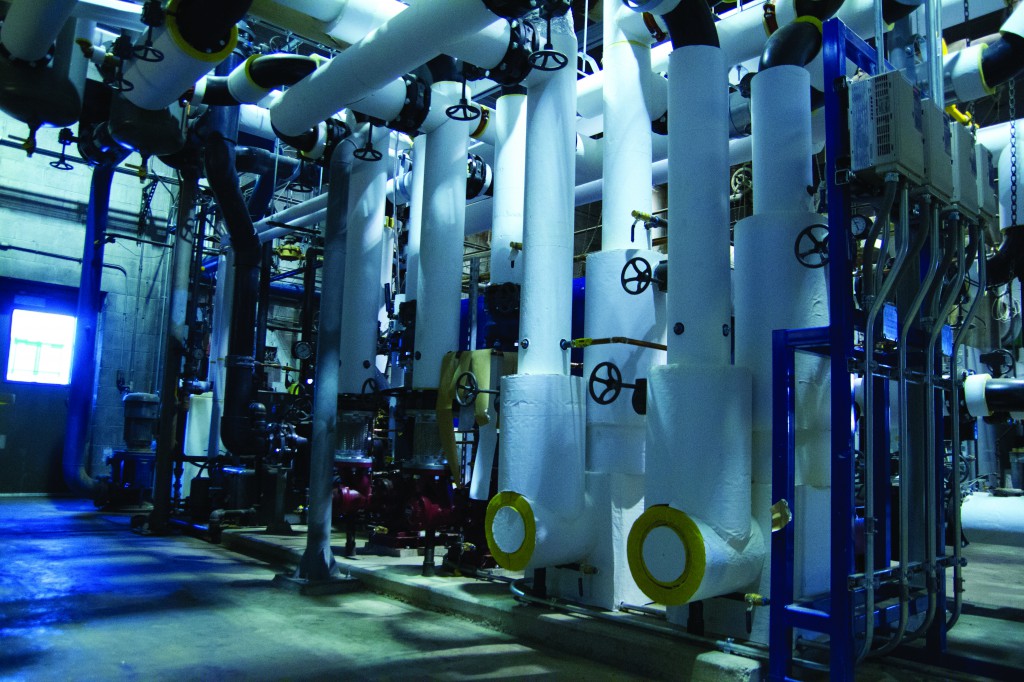The Record ? features lead news ? This winter, geothermal unit ...

Photo by Alex Pletcher
By Jeffrey Moore
Features Editor
Last spring, Goshen College partnered with Chillit Chillers, a local business that designs and manufactures geothermal monitoring systems, to install an efficient heating and cooling system for Umble Center, the Good Library and parts of the Union Building.
Glenn Gilbert, GC sustainability coordinator, said that geothermal, though expensive to install, was a good option for the college. ?We have a desire to get away from steam,? said Gilbert, ?which is a wonderful [heat] source but is not very efficient.? The project came at this time because several buildings needed heating upgrades anyway.
But why should students care about a utility upgrade? And what is so special about geothermal technology?
The answer: Efficient utilities are both economically and ecologically friendly. John Ross Buschert, professor of physics, talked about the advantages of geothermal energy. ?Geothermal energy makes people think of geysers which is just not true,? Buschert said. ?It would be better to call it a ground source heat pump.?
Water is a free resource and perfect for heat pump technology. You can harvest ?a huge amount of heat from pulling water [out of] the ground,??Buschert said.
The science works something like this: in the summer the system pumps cold water through a pipe inside a building. The cold water absorbs heat from the air and dumps it into a pond the college will install behind Newcomer Center. In the winter, the new system reverses the process by running groundwater through a heat exchanger where a mild amount of electricity transfers some BTUs (British Thermal Units) to a pipe for hot water. The senior apartments and Recreation-Fitness Center already use a similar system for air conditioning.
The physics are sound; we use heat pumps all the time, such as in an air conditioner. One crucial difference between an air-to-air heat pump and a geothermal heat pump is that air temperatures tend to fluctuate. When the difference is slight, 75 degrees outside to 65 degrees inside, a minimal amount of energy is required. With the right machine, it is possible to reverse the process and heat a house using harvested BTUs from outside.
In northern Indiana, however, winters bring weather in the teens and even below zero, which means the difference is too great for an air-to-air pump to run effectively. The advantage of geothermal energy is that ground water is always 55 degrees Fahrenheit, a great starting point for either cooling or heating.
Chillit Chillers uses a complex computer diagnostics program to monitor the whole system and ensure the best efficiency. The high-tech controls allow the college to make adjustments for minor changes in demand and take advantage of excess energy. The system can even use a hot-water loop and a cold-water loop simultaneously. When the cold water warms up, instead of dumping the warm water into the drainage system, it transfers the heat to the hot-water pipe through a heat exchanger; essentially recharging the hot-water pipe and the cold water pipe at the same time.
Gilbert expects this system to improve efficiency to almost 95 percent, a huge improvement over the current natural gas combustion system, which only runs at 65 percent efficiency. According to Medlock, the upgrade could save the college 40 to 60 percent on its heating and cooling costs and could eliminate the need for natural gas.
One possible disadvantage to geothermal energy is the huge amount of water that would be extracted from the aquifer ? or the deep layer of ground water that feeds wells and is used for irrigation. The wells can each pump about 300 gallons of water per minute, which ?would be entirely inappropriate in some areas,? said Gilbert, ?but fortunately the aquifer in this area is immense.? Gilbert also said that most of the water will be drained nearby where it can safely work its way back underground.
This new upgrade will be a win all around. The college gains new highly-efficient and cost-effective utilities, a blooming local company gets to showcase its work in its hometown and students can rest assured that the system helps reduce the college?s carbon footprint ? peace by peace.
Source: http://record.goshen.edu/2012/11/23351-this-winter-geothermal-unit-heats-three-buildings
Misty May And Kerri Walsh Jake Dalton London 2012 field hockey Missy Franklin Hunter Pence NBCOlympics Danell Leyva

0টি মন্তব্য:
একটি মন্তব্য পোস্ট করুন
এতে সদস্যতা মন্তব্যগুলি পোস্ট করুন [Atom]
<< হোম